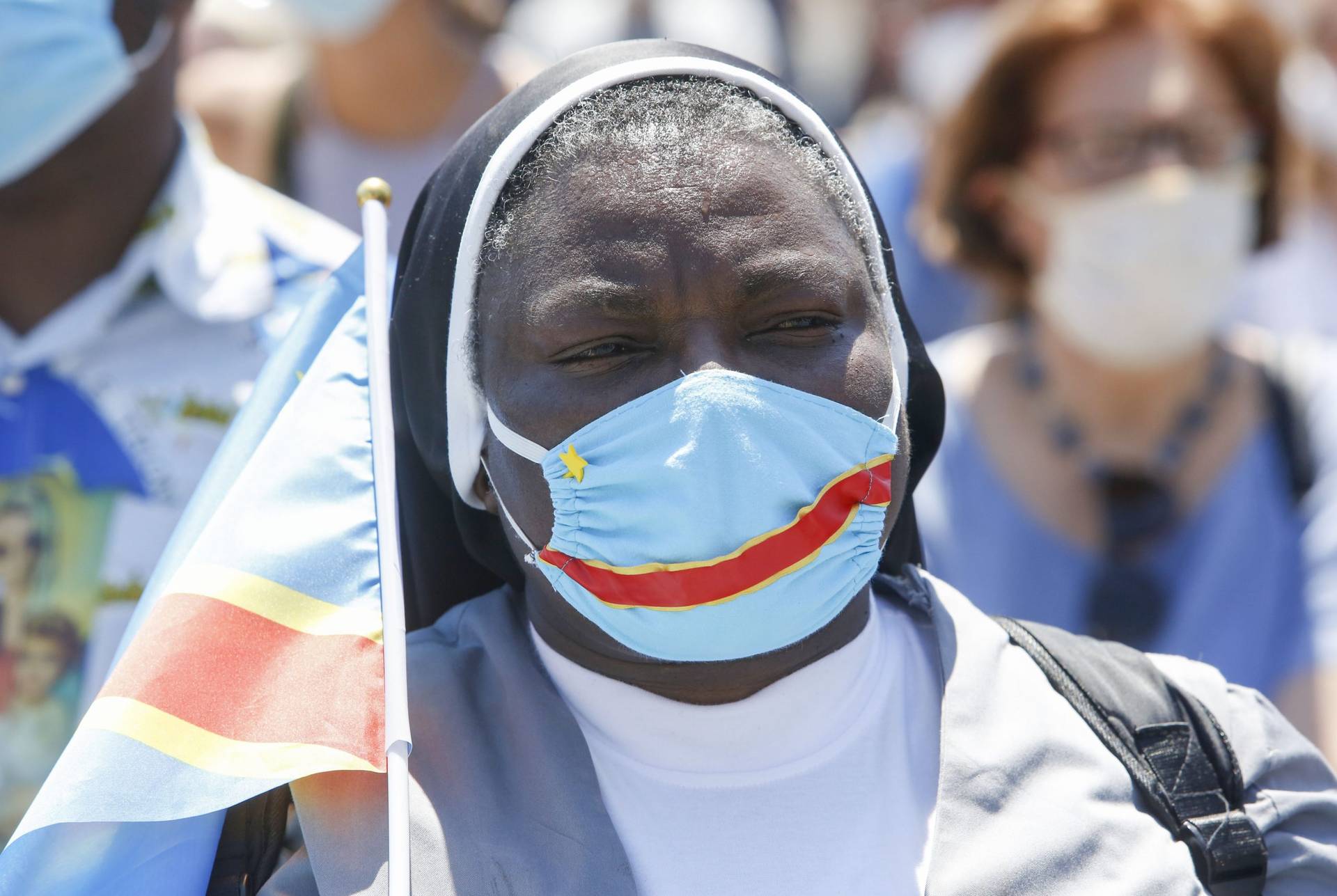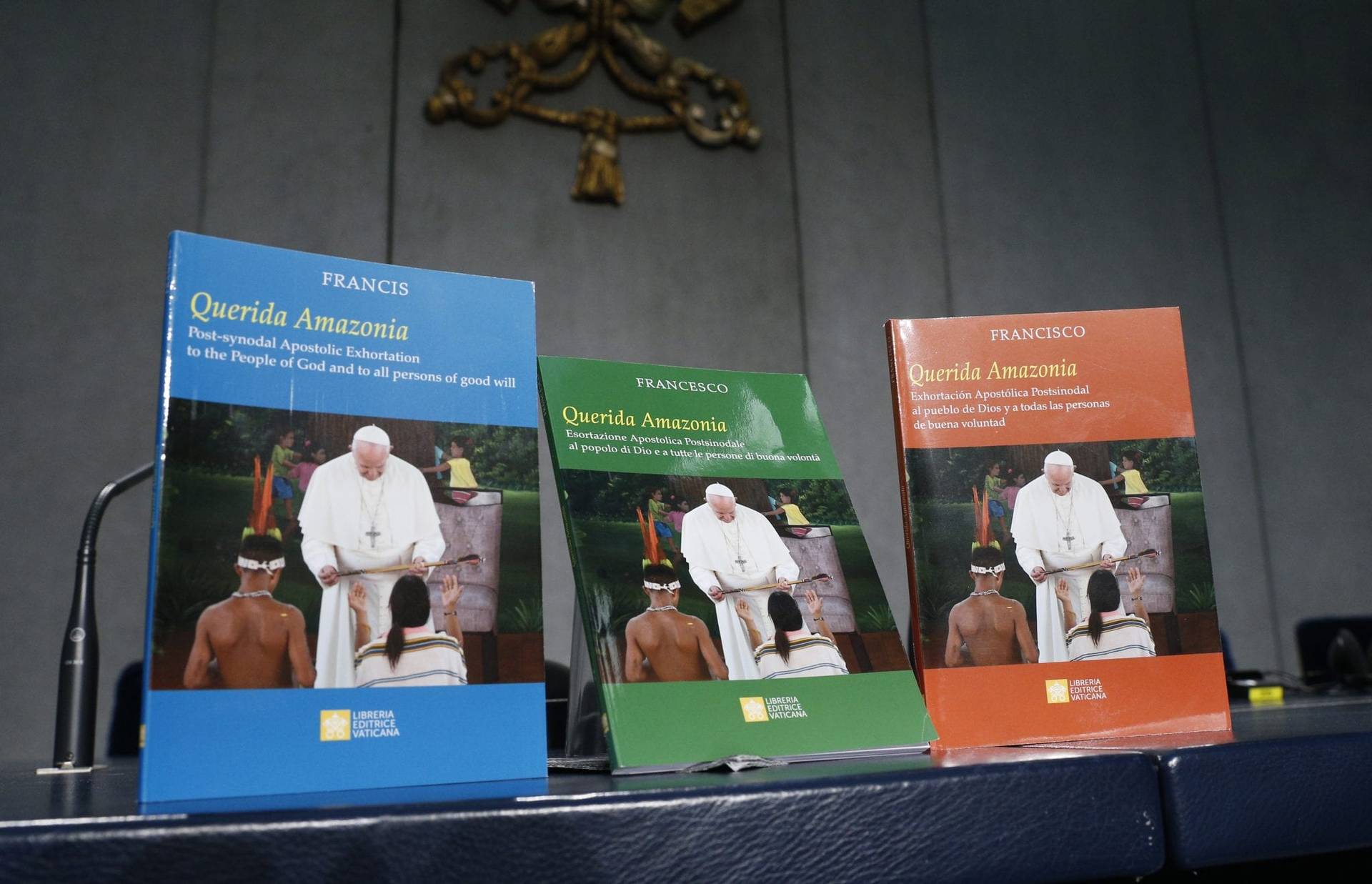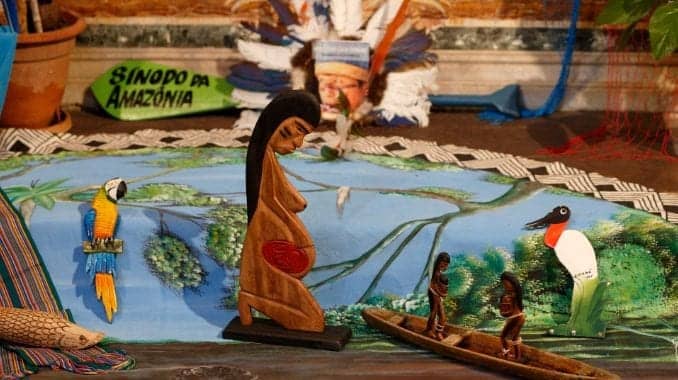NEW YORK — Battle lines have been drawn for October’s highly anticipated Vatican summit on the Amazon region, where the proposal to give isolated communities access to the sacraments by ordaining married men has led to uproar — frustrating some of the meeting’s organizers for distracting from other pastoral concerns at stake in the region.
Father Michael Czerny, a Jesuit priest and longtime Vatican official who Pope Francis will make a cardinal a day before the synod opens, recently issued a plea for the Church to realize the urgency of greater attention to the Amazon region and not to be distracted by “contemporary misconceptions and pernicious practices” regarding it.
Czerny, who will serve as a special secretary to the Amazon synod, cautioned that “the social and the natural cannot — and the environmental and the pastoral must not — be separated,” — likely as an indirect response to retired German Cardinal Walter Brandmüller who said that the synod’s working document is “heretical” and should be rejected.
Brandmüller went on to ask: “What do ecology, economy, and politics have to do with the mandate and mission of the Church?”
“Dangerous compartmentalizations — intellectual and spiritual, economic and political — have put human life in jeopardy on Earth, the common home of humanity,” Czerny countered.
Such disagreements are not new, and for nearly four decades the region of the Amazon has been politically contentious and theologically divisive.
But in the lead-up to next month’s gathering, a network of far-right groups in Brazil headed by a controversial traditionalist with a long history of opposing Vatican II seems eager to capitalize on next month’s events to gain new momentum.
The Pan-Amazonian Synod Watch
One of the primary hubs of resistance to the October gathering is the Pan-Amazon Synod Watch, which was created by the Plinio Corrêa de Oliveira Institute (IPCO) and its “sister organizations,” the right-wing Societies for the Defense of Tradition, Family and Property (TFP).
Oliveira founded the TFP in 1960 as a bulwark against “communist” influences in society and the Church. Oliveira died in 1995, but he remains a powerful totem among traditionalist Catholics who favor an Ancien Régime view of the Church and a functioning hereditary nobility, primarily in Latin America and parts of Europe.
The organization, which claims to be the “largest coalition of associations in defense of Christian civilization,” has long sought to boost its visibility by conducting campaigns that are attractive to a wider number of Catholics, including the America Needs Fatima program in the United States.
The synod on the Amazon is giving it a new campaign with which it hopes to spread its message.
“Based on the solid, two thousand-year doctrine of the Catholic Church as well as serious scientific studies, this site aims to alert all those who are legitimately concerned about the news circulating about the Synod of Bishops for the Pan-Amazon region, to be held in October 2019 in Rome,” states the TFP-sponsored website.
In Rome on the eve of the synod, the organization will host a daylong workshop on “The Truth of the Amazon,” led by a number of traditionalist thinkers who are skeptical of the synod’s major areas of focus, including the Italian historian Roberto de Mattei, who penned a biography of Oliveria.
The Pan-Amazon Synod Watch website warns that the synod could turn the Church “into a structure-less and essentially ‘tribal’ organization, in clear opposition to twenty centuries of Christianity.”
“The Indigenist Theology now being promoted is nothing more than a radicalization, behind the mask of ecology,” they caution.
Among the editorials published on the site, they argue that the synod proposals would turn priests into “Protestant pastors” and that the gathering is in thrall to a “neo-Pagan agenda.” The 1977 book by Plinio Corrêa de Oliveira, Indian Tribalism: The Communist-Missionary Ideal for Brazil in the Twenty-First Century, is also promoted as a resource for understanding what’s at stake in the synod process.
The Godfather of the Synod Resistance
Oliveira is in many ways the godfather of the resistance to the Amazon synod; he was just as much a critic of Pope John Paul II’s outreach to the indigenous communities of the region as his organization is of Pope Francis today.
At age 24, Oliveira became the youngest congressman in the history of Brazil. After creating the Catholic Electoral League to mobilize traditionalist Catholics, he was a trenchant critic of the pan-continental bishops’ organization created in the 1950s, the Latin American Episcopal Council (CELAM).
Oliveira was in Rome in the 1960s during the Second Vatican Council and described it as “a point in history as sad as the Death of Our Lord.” In 1985, the Brazilian bishops rejected the movement for its “lack of communion … with the Church in Brazil, its hierarchy, and the Holy Father.”
Father Dário Bossi, provincial superior of the Comboni Missionaries in Brazil, who has worked in the Brazilian Amazon region of Maranhão for over a decade, told Crux that Oliveira had a “fascist ideology” and that TFP is “an elite movement, which has never been in communion with the Brazilian episcopate.”
In particular, Oliveira did not hide his disdain for indigenous Catholics, whom he saw as incompletely converted pagans.
Oliveira described indigenous culture as one that endangered Catholic family life and private property.
“The Indian cannot be compared to the ‘civilized’ man who is acquainted with private property, the monogamous and indissoluble family,” he writes in 1977’s Indian Tribalism.
In another essay, Oliveira argues the “ultimate ideal of the green movement is to destroy our way of life, including the present-day economic system of the three Americas, which is capitalism, and to return to a tribal lifestyle.”
Oliveira, an early climate-change skeptic, described it as a myth peddled by “major media and most prestigious elites.”
Commenting on Oliveira’s history and the influence of TFP, Jesuit Father Aloir Pacini, vicar general of the archdiocese of Cuiabá, Brazil and an expert in indigenous communities, said they “do not support a church that thinks of a just and fraternal society, because they are more interested in…gathering money to support the elites.”
“When the elite feel threatened, they criminalize the blacks, the Indians, the union leaders, the leftist politics and the state when it dares to control the market or does not allow corruption,” he told Crux.
“This was the way of doing politics that is traditional in Brazil. Thus the right of the Indians to their traditional territory is not considered, and worse, they enslaved them to accumulate wealth, because the elites could not work. It was ugly to have their hands calloused!” Pacini said.
Historian Rodrigo Coppe Caldeira told Crux that while the TFP has long been in engaged in religious debates, particularly pertaining to the Catholic Church, they are motivated by political concerns.
“The idea of creating international networks against what they call the ‘enemy of Christians’ remains very much present in traditionalist groups, and their networks today take on new forms, with new characters, particularly with the rise of populist governments from the right,” said Caldeira, a professor at the Pontifical Catholic University of Minas Gerais in Brazil.
Caldeira said that TFP adherents understand the synod as “a tool of the left,” which is also in line with the thinking of recently elected Brazilian President Jair Bolsonaro, and that their influence is on the rise.
“Right-wing groups have grown and broadened their voices, particularly after Bolsonaro’s victory, which has also led to providing this amalgam between right-wing religious groups and political groups,” Caldeira said.
In the United States, TFP members have been active supporters of President Donald Trump and most recently have been involved in efforts to defend Supreme Court Justice Brett Kavanaugh against accusations that he engaged in sexual misconduct against women while in high school and college.
Backlash and Battle Lines over the Synod’s Working Document
In the lead-up to the synod, the Plinio Corrêa de Oliveira Institute has sought to raise the profile of its namesake’s legacy and ideas through the Pan-Amazonian Synod Watch, which serves as a clearing house for articles critical of the synod.
Although a conservative, German Cardinal Gerhard Müller is far removed theologically from the pre-conciliar thought of Oliveira.
The cardinal is a longtime friend of the leftwing Peruvian theologian Gustavo Gutiérrez, with whom he co-authored On the Side of the Poor: Liberation Theology.
Yet his articles are featured on the Pan-Amazonian Synod Watch website, and after the release of the synod’s working document, called Instrumentum Laboris, his criticisms used similar language to that of Oliveira.
The former head of the Vatican’s doctrinal watchdog office, the Congregation for the Doctrine of the Faith (CDF), called “indigenous theology” an “invention of social romantics.”
“A worldview with its myths and the magical ritual of Mother Nature, or of her sacrifices to the gods and spirits that cause us great fear, or that seduce us with false promises, cannot be an adequate approach to the coming of the Triune God in His Word and in His Holy Spirit,” he wrote.
The preparatory document for the Pan Amazon Synod, Müller warned, has “an ideological vision that has nothing to do with Christianity.”
Although the German cardinal wasn’t quoting Oliveira, the TFP was happy to feature his comments, which are similar in tone to the late Brazilian reactionary.
Most recently, Cardinal Raymond Burke voiced similar concerns as Brandmüller and Müller, urging Catholics to pray and fast ahead of the synod and warning of “serious theological errors and heresies” in the working document.
Burke has been a long-time collaborator with Mattei, who is helping lead the resistance to the synod and recently published a new book, Love for the Papacy and Filial Resistance to the Pope in the History of the Church, for which Burke penned the foreword.
Amazon Synod happening as international attention turns to ‘world’s lung’
The synod’s Instrumentum Laboris builds on Francis’s 2015 encyclical Laudato Si’ calling for global ecological conversion and highlights the special challenges facing Amazonia, which includes 7.8 million square kilometers of land in Brazil, Bolivia, Peru, Ecuador, Colombia, Venezuela, Guyana, Suriname, and French Guiana.
As the synod nears, concern over the Amazon has once again made international headlines after a series of forest fires destroyed over 2 million acres of the rainforest, with repeated calls from world leaders to take seriously the looming environmental crisis. Along with the call for protecting the rainforests and rivers that serve as a lung for much of the world, the preparatory document calls for the creation of “new ministries to respond more effectively to the needs of the Amazonian people.”
Pacini said that “the process of listening to the traditional peoples of this biome is already the greatest victory of the Amazon synod.”
“In Puerto Maldonado, the indigenous people and the communities of the Amazon have been able to speak and be listened to by those who lead the churches and society,” he told Crux.
Bossi said that it’s his prayer that “the Church in the Amazon actually take an Amazonian face from the indigenous leadership and their own way to embody and celebrate the faith, and that the Holy Spirit is the protagonist of this synod and the synod fathers let themselves be led by them and by a docile listening to the cry of the communities that collectively they represent.”
Pacini concurred, saying that only if that listening takes place will the Amazon synod be a success.
“The dense territory of Amazonia is a symbol that goes to Rome so that we can also learn to take care of other threatened biomes on the planet and live in a more harmonious way,” he told Crux.
“We can live well and happily in simplicity so that this planet earth becomes our great temple where we live the love of God, our neighbor, and ourselves, in our common home in the sense of an integral ecology as proposed by the pope in Laudato Si’,” he said.
Follow Christopher White on Twitter: @cwwhite212
Crux is dedicated to smart, wired and independent reporting on the Vatican and worldwide Catholic Church. That kind of reporting doesn’t come cheap, and we need your support. You can help Crux by giving a small amount monthly, or with a onetime gift. Please remember, Crux is a for-profit organization, so contributions are not tax-deductible.
















